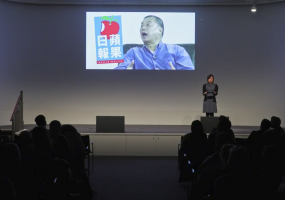The Encounter of Islam with Europe
27 Nov 2007
John Lloyd (who chaired the event) writes:
More breath is spent in debating "Islam in Europe" than almost anything else now: some of it spent to little purpose. But in a lunchtime debate last Wednesday (21 November), promoted by the Royal Society of Arts and the Reuters Institute, two leading liberals came together, clashed, agreed and held a packed chamber rapt for nearly 90 minutes. "An encounter between Ayaan Hirsi Ali and Timothy Garton Ash" brought together two figures famed for their championship of freedom. Timothy Garton Ash, Isaiah Berlin Fellow, Professor of European History at Oxford and a member of the Reuters Institute's steering committee, had as a journalist in Eastern Europe in the eighties illuminated the rising dissidence against Communist rule in Poland, East Germany, Czechoslovakia and Hungary - and in a series of news stories, articles and books, brought home to a British audience the nature of the challenge to an oppressive state. Ayaan Hisri Ali has a biography which justifies the overused word incredible. Born in Somalia, she was brought up in a peripatetic and strict Moslem family, who confined her to the home, had her undergo circumcision and would have forced her into marriage: she rebelled, managed to get a flight to the Netherlands, and stayed. She put herself through college, became active in politics, was elected as an MP for the main centre right party - and made a film with the outspoken film maker, Theo van Gogh. The film was called Submission, and showed verses of the Koran projected on a naked woman's body: because of it, van Gogh was murdered by an Islamist exremist, Hirsi Ali threatend with death. A little later, the government threatened to deprive her of her citizenship because she had lied on a technicality of her entry - a lie she had admitted several times. The decision was reversed after an all-night debate in the Hague parliament - but Hirsi Ali took up an offered post in the American Enterprise Institute, and now lives in the US. Her two books, The Caged Virgin and Infidel, have been best sellers round the world. These two agreed about much. But there was a bone of contention, which had become famous on web sites and in magazines. In a review in the New York Review of Books, Garton Ash had chided Hirsi Ali for being an "Enlightenment fundamentalist" - and had noted that if she were short and fat instead of tall and beautiful, she would not have attracted the same attention. Hirsi Ali rejected both of these: and in his opening speech, Garton Ash retracted the former phrase, and protested that he had not meant to be condescending with the second. The substantial argument between them was on the nature of of the objection to Islamic extremism and anti-liberalism. For Garton Ash, these had to be opposed - but liberals had to recognise that effective opposition to Muslim intolerance often came from Moslems who remained firmly inside the religious camp, fudged some issues and took up non-liberal positions. They should be supported, he argued, if their activities led to the peaceful enfolding of Islam into the European democratic space. But opposition to practices, statements and movements which sought to dilute or destroy the freedoms on which liberal societies were based had to be absolute. Hirsi Ali was warier of this, preferring full throated opposition to all deviations from a liberal approach. She said that she did not wish all Moslems to renounce their religion: but did want a recognition that Islam itself, not merely extreme versions, could be the problem. For women especially, she said, the practices of Islam could be a nightmare: western liberals had to realise that, and not genuflect before "cultural values" which were, in effect, oppressions. This was outside of the Reuters Institute's focus on news media, but it was a chance too good to miss. The RISJ now has an agreement with the Royal Society of Arts to put on joint events in London and elsewhere: watch this website for future such events. Read Nick Cohen's article about the event at comment is free... This event was promoted by the Royal Society of Arts and the Reuters Institute for the Study of Journalism.



